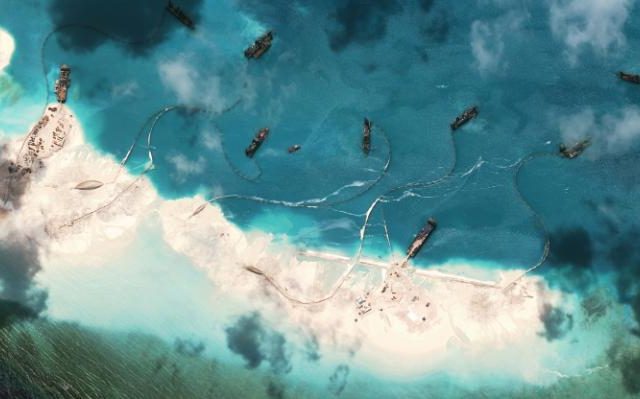Alwaght-China has rejected a verdict of an international tribunal to the effect that Beijing has no “nine-dash line” claiming rights to much of the South China Sea.
The Permanent Court of Arbitration (PCA) in The Hague on Tuesday ruled against China's territorial claims in the South China Sea, after the Philippines challenged Beijing's right to exploit resources across vast swathes of the strategic waters.
In a 497-page ruling that risks stoking further tensions in South-East Asia, a Hague-based arbitration court said there was no legal basis for China to claim historic rights over the waters of the South China Sea and that it had breached the Philippines' sovereign rights with its actions.
China immediately said it would defy the decision, which it described as “null and void” with “no binding force”.
In a short statement issued by state media, Chinese President Xi Jinping said that China's territorial sovereignty and maritime interests in the South China Sea will not be affected by the ruling.
A front-page editorial published by the People's Daily on Monday noted that, China is not the one doing harm, but the victim. Looking at the law, it’s the behavior of the Philippines and some other countries disobeying international laws and UN charters that should be condemned. All illegal actions to invade another country’s territory should be forbidden.
As anyone can see, the United States is trying to form a gang, desperately pushing the South China Sea issue in order to make it a multilateral, international matter, with the delusion that China would face so-called diplomatic pressure.
The (upcoming) ruling disobeys international law, but why does the self-proclaimed “international jury” America still feign ignorance about that? Just like the famous American lawyer Bruce Fein said, the US’s South China Sea policy is a sign of its “dangerous imperial thinking,” which is hegemonism. The US talks a lot about international law, but history shows that the US plays it. The US would endorse a law if it is in its interest. If a law restricts its behavior, the US would demean it. It would legalize the illegal, and make the legal illegal.
Beijing Rejects Third Party Dispute Settlement
In a statement, the Chinese foreign ministry noted that said China neither accepts nor recognizes the verdict by the international tribunal.
China says the Philippines' initiation of arbitration breaches the agreement between the two states, violates the United Nations Convention on the Law of the Sea (UNCLOS), and goes against the general practice of international arbitration, and that the Arbitral Tribunal has no jurisdiction.
On 29 October 2015, the Arbitral Tribunal rendered an award on jurisdiction and admissibility. The Chinese government immediately stated that the award is null and void and has no binding force. China's positions are clear and consistent.
Beijing maintains that the unilateral initiation of arbitration by the Philippines is out of bad faith and violates international law.
The authorities in Beijing reiterated that the Arbitral Tribunal aims not to resolve the relevant disputes between China and the Philippines, or to maintain peace and stability in the South China Sea, but to deny China's territorial sovereignty and maritime rights and interests in the South China Sea. the subject-matter of the arbitration initiated by the Philippines is in essence an issue of territorial sovereignty over some islands and reefs of Nansha Qundao (the Nansha Islands), and inevitably concerns and cannot be separated from maritime delimitation between China and the Philippines.
The Chinese government has reiterated that, regarding territorial issues and maritime delimitation disputes, Beijing does not accept any means of third party dispute settlement or any solution imposed on China.
US using Caribbean Strategy in South China Sea
Looking back at the drama, it's not difficult to see that the United States has played an important role in disturbing the once peaceful waters since it adopted a "pivot to Asia" strategy.
And it's not the first time for the nation to do so. Having been regarding Latin America as its backyard, the United States has never stopped making waves in the Caribbean.
Throughout the 20th Century, the United States has been incessantly cruising its warships on the Caribbean waters, trying to assert its influence over the region.
Its interference that blocked the path of independent development for Caribbean countries, and resulted in long time of turmoil as well as social stagnation in some of the countries.
And now it is using the same strategy in the Asia-Pacific, specially, the South China Sea.
Since a US strategy shift in 2009 toward Asia-Pacific, tensions and disputes between countries in the South China Sea have been increasing dramatically.



























